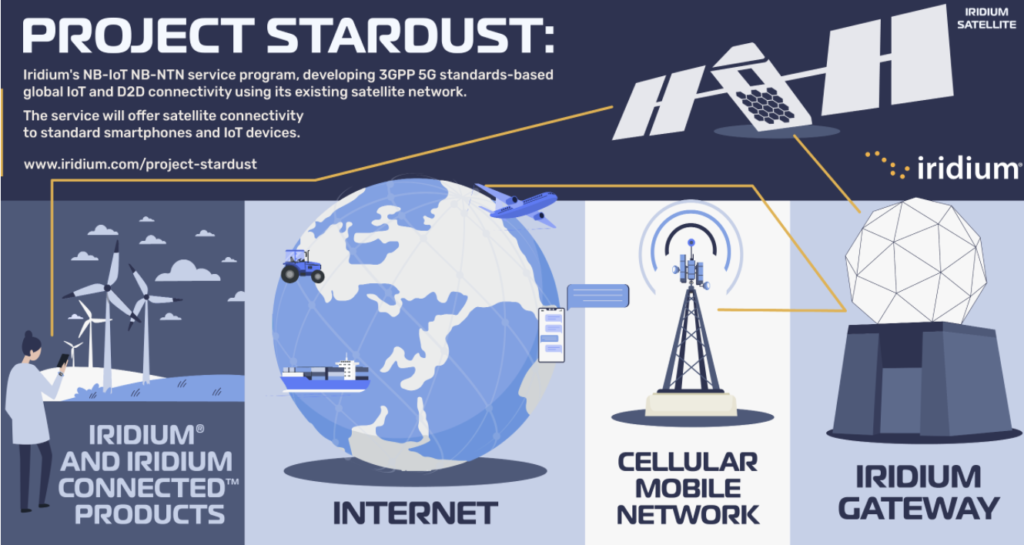

Meanwhile,SpaceX’s Starlink demos first text message via direct-to-cell on LEO launched last week, as China announces LEO ambitions
Iridium Communications announced Project Stardust which it describes as “the evolution of its direct-to-device (D2D) strategy with 3GPP 5G standards-based Narrowband-Internet of Things (NB-IoT) Non-Terrestrial Network (NB-NTN) service development”.
It will be deployed on Iridium’s existing satellite network, claiming this gives it “a unique ability to offer both high-quality proprietary and standardized D2D and IoT services to its customers”.

In other words, sweating its assets and trying to get ahead before SpaceX’s Starlink is fully deployed (see below) or Jeff Bezos’ Project Kuiper gets off the ground – which should be shortly.
Recruitment drive
Iridium says that these early days of programming its low-Earth orbiting (LEO) satellites offer “a special opportunity to smartphone companies, OEMs, chipmakers, mobile network operators (MNO) and related IoT developers to have their requirements woven into the fabric of the Iridium network”.
The company says it is already Iridium “collaborating directly” with several such companies but doesn’t name any of them.
Iridium’s CEO Matt Desch says, “This is an exciting moment for Iridium and is a testament to the flexibility and capability built into our satellite constellation.
“The industry is moving quickly towards a more standards-based approach, and after surveying the field, we found that we’re the best positioned to lead the way using our own network, particularly given our true global coverage.”
Standards’ stellar power?
Iridium is designing its initial NB-IoT offering to support 5G NTN messaging and SOS capabilities for smartphones, tablets, cars and related consumer applications. By adopting the service, manufacturers can add satellite connection to standardised devices, it says, taking advantage of globally allocated and coordinated Iridium spectrum.
The Iridium network supports approximately 1,300 SOS and emergency (911 or equivalent) incidents per year, around the world and has readily available systems, processes, and partners to implement this capability for new devices.
Meanwhile…
Last week SpaceX launched its first six Starlink LEOs last week that are intended to provide direct direct-to-cell or direct-to-device or direct-to-mobile or whatever you want to call it communications. Now it says it has sent and received the first text between mobile devices using T-Mobile’s network spectrum.
T-Mobile was the first operator to sign up as a partner to the Starlink project in 2022.
SpaceX says it is now “uniquely positioned to rapidly scale” its direct-to-mobile constellation. The strategy is to launch hundreds of LEO satellites rapidly to achieve its goal of providing commercial text services in 2024, and then phone calls, data and IoT services in 2025. Read more.









